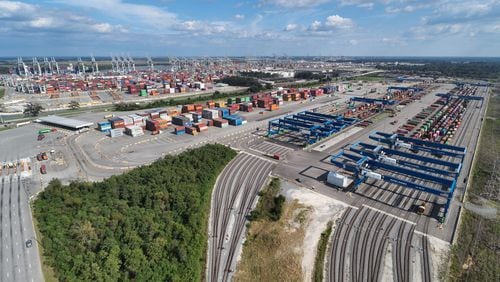Growing up on the Georgia coast, I thought we were immune to hurricanes. I was told the Gulf Stream was an indestructible barrier preventing these storms from ever hitting my hometown of Savannah. As far as I could tell, that was true.
Even as neighboring states got hit each hurricane season, the worst storms seemed to pass us by. Until 2016, the last hurricane that hit Savannah was Floyd in 1999, five years before I was born. But when I returned home from my first-ever evacuation in 2016 to find that our centuries-old live oak tree had come crashing down just feet from my house, I knew something had shifted and that climate change was at the root. Since then, these once-rare storms make landfall year after year.
The effect of climate change on Georgia’s coast is not seen only during hurricane season. In just my lifetime, we have seen a drastic rise in the occurrence of strong storms and flooding that are putting our lives at stake. As Earth warms at increasingly alarming rates, these storms will get only more intense and more destructive.
Savannah residents face additional threats to our livelihood because we live in a port city. The Port of Savannah, just miles from my house, is one of the largest and busiest ports in the country. Thousands of Savannahians face the negative health effects of pollutants that passing cargo ships and port operations put in our air, water and land.
Communities of color and low-income communities are disproportionately affected by port emissions, perpetuating historic injustices in the city. Though the port has begun to reduce its emissions, our leaders have a long way to go to adequately protect the health of surrounding communities and ecosystems.
Remedies for these environmental problems are an urgent need, not a problem for the future.
Credit: Handout
Credit: Handout
When I moved to Atlanta two years ago, I quickly realized the two different worlds that exist in Georgia. The people I met in Atlanta knew little about the issues that faced our coast. To be fair, I knew little of the environmental issues that faced Atlanta. I realized that if we want to fight for a better future for everyone in Georgia, we need to understand each other, uniting against the climate crisis, our common enemy.
What affects the coast affects everyone in the state. All of these environmental issues will only be exacerbated if decision-makers don’t take action to protect our many diverse communities from these threats to our way of life.
Fortunately, recent policies represent a step in the right direction. The Inflation Reduction Act, signed into law in August 2022 and championed by Georgia Sens. Raphael Warnock and Jon Ossoff, is spurring new investments in coastal resilience and port decarbonization across the state. The bill provides significant economic support to local projects that will help make our state safer, more resilient and just for communities suffering from toxic pollution and harmful emissions.
A project in the Gullah Geechee Cultural Heritage Corridor will create job opportunities to implement a restoration and resilience plan. On Ossabaw Island, one of the many barrier islands that make up coastal Georgia, another project will help strengthen the shoreline using natural materials while preserving the cultural history of the area.
Just last month, Environmental Protection Agency administrator Michael Regan announced the launch of the Clean Ports Program, which will invest $3 billion from the Inflation Reduction Act to help our nation’s ports address public health and environmental issues. With this investment, the Port of Savannah has the opportunity to remedy its historic environmental injustices and commit to ensuring clean air for neighboring communities.
The White House’s Ocean Climate Action Plan, which just celebrated its first anniversary, recognizes the ways that the ocean can be a source of solutions for climate change, and it is bringing waves of climate action to communities nationwide.
It can be hard to be optimistic in the face of climate change, but without believing in a better future, we cannot fight for one. Though our senators have been on the frontline of some of these issues, we must demand that elected officials all around our state support these efforts and call on our supporters to be even more active in this fight.
With recent efforts in Congress to roll back parts of the Inflation Reduction Act, Georgians who want to protect this landmark commitment to our home must push for even more climate investments. To do this, we need to be united as Georgians, no matter which city we call home.
Kyra Stillwagon is an environmental youth leader from Savannah and an EarthEcho International Youth Leadership Council member. She is a student at the Georgia Institute of Technology, where she studies Public Policy.
About the Author







